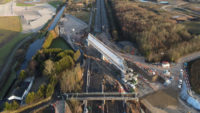Balfour Beatty Reports Loss Amid UK Recession

As the U.K. formally moved into recession, with negative GDP growth for two consecutive quarters, the country’s largest contractor on Aug. 12 reported a six-month pre-tax loss of $34 million, down from a $82 million profit figure for the same period last year, largely due to COVID-19 pandemic impact.
Across the country, construction output fell 35% in this year’s second quarter, while the overall economic output dropped 20.4%, according to the Office of National Statistics.
Reporting the loss of profits despite a 5% sales hike in the first half to $5.3 billion, Balfour Beatty’s CEO Leo Quinn said the pandemic’s financial impacts were unavoidable but temporary. “We have preserved the disciplines, expert capability and financial strength we will need as markets move back to normal and then beyond, driven by fiscal stimulus for infrastructure.” He praised the company’s workforce for “working tirelessly whatever the challenge.”
However, only 15% of contractors responding to a survey by the Civil Engineering Contractors Association predicted workload to rise in the next 12 months.
Group Director of External Affairs Marie-Claude Hemming expressed surprise at this gloomy prognosis since “we would expect as the U.K. government rolls out its investments in infrastructure, it will work with industry to accelerate schemes and this outlook will improve.”
More than 40% of survey respondents reported falling workloads in the second quarter.
But “despite the government putting the industry at the front and center of its recovery plans,” the Construction Products Association anticipates continuing uncertainty for the sector in its new forecast. It expects this year’s construction output to fall by 20.6%, with the biggest drops in private housing (-33%) and commercial buildings (-29%).
CPA Economics Director Noble Francis expects an 18% rise in construction output next year, but “this is compared with a low base of activity in 2020 and will still be 6.4% lower than pre-coronavirus levels,” he adds. “The delivery of major infrastructure projects will be crucial to growth in 2021, with activity on site less affected by social distancing and major projects like HS2 (high speed rail) driving significant growth for the sector.”



